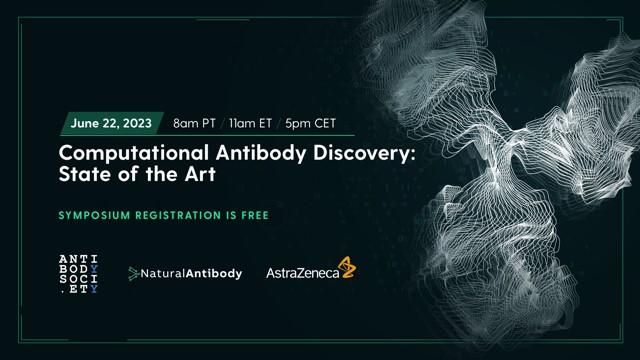View the content On Demand on our YouTube channel.
Recent advances in computational and machine learning sciences have had a substantial impact on the antibody discovery process. Novel protocols that incorporate computational approaches can now be used to generate functional antibody therapeutics with good developability. In silico methods complement existing experimental strategies, and their use has become more mainstream in the biopharmaceutical industry. However, the application of computational de novo design strategies requires a thorough understanding of their capabilities, limitations, and experimental validation, as well as their place in the overall discovery pipeline and value chain.
In this virtual Symposium, leading experts in computational antibody discovery from academia and industry discussed their scientific strategies and progress to date. The event served as a platform for better understanding of the breakthroughs and future directions in this multidisciplinary field, through talks, a panel session, and your questions and insights.
The Symposium commenced with speakers Drs. Pietro Sormanni, Tzvika Hartman, Victor Greiff, Sandeep Kumar, and Ben Holland. The panel session was moderated by Konrad Krawczyk and included Jiye Shi, Victor Greiff, Sandeep Kumar, and Ben Holland. The Symposium concluded with final remarks by Andrew Buchanan.
Biographical information for the Symposium speakers, panelists and hosts can be found here.
Agenda (times in ET)
11am-11.05 Introduction (Janice Reichert, The Antibody Society)
11.05-11.45 Keynote address: Pietro Sormanni (University of Cambridge)
Third generation approaches of antibody discovery and optimisation
Antibodies play a crucial role as reagents in research and diagnostics, and are a key class of therapeutics. However, current technologies for antibody discovery and optimization are still subject to limitations. Established screening procedures are laborious, and targeting predetermined epitopes and optimizing multiple biophysical traits simultaneously remains a challenge. In this presentation, we will discuss emerging computational antibody design methods, which enable the targeted design of antibodies for pre-selected epitopes and the prediction and modulation of their developability potential through optimization of multiple biophysical properties. Overall, it is increasingly possible to complement well-established in vivo (first generation) and in vitro (second generation) methods of antibody discovery with in silico (third generation) approaches, with potential time and cost-saving benefits. These approaches are becoming sufficiently mature to be highly competitive for some applications, thus offering novel opportunities to streamline antibody development.
11.45-12.15 Tzvika Hartman (Biolojic Design)
AI-driven design of smart therapeutics
Proteins are complex machines that can sense, and dynamically respond to, changes in their surroundings. Moreover, they have the capability to agonize other proteins or bind to diverse targets, depending on the prevailing biological conditions. Despite this incredible functional potential, therapeutic proteins are currently being utilized primarily as inert antagonists. This underutilization of protein functionality represents a significant missed opportunity.
Biolojic Design’s computational platform enables the creation of dynamic antibodies. These antibodies are programmed to react to environmental changes and exhibit distinct actions under varying biological conditions. This approach is geared to yield more effective and safer therapies. The first computationally designed dynamic antibody is currently in phase 1/2 clinical trials. During this talk, I will provide an overview of Biolojic’s design process, which combines both computational and experimental techniques. I will also highlight the distinctive characteristics and functions of the antibodies created through this approach.
12.15-12.30 Break
12.30-1pm Victor Greiff (University of Oslo)
Computational developability profiling of antibody repertoire data
Developability, the set of physicochemical properties of an antibody relevant for manufacturing and success in clinical trials, is one of the key determinants for success during clinical testing and any developability parameters can be computed from the antibody sequence and structure. Although the distribution of developability parameters of natural antibody repertoires may provide guidance on the potential suitability of therapeutic antibody candidates, the sequence and structural distributional landscape of the natural antibody repertoire has not yet been described. We quantify the redundancy, sensitivity, and predictability of developability parameters in natural and clinical-stage antibodies. Exploiting the vast amount of available antibody high-throughput data will facilitate the derivation of the rules underlying developability profiles to guide antibody therapeutic discovery.
1-1.30pm Sandeep Kumar (Boehringer Ingelheim)
Biopharmaceutical Informatics: Syncretic use of computation and experimentation in discovery and development of biotherapeutics
In this talk, Dr. Kumar will describe case studies of computation and experimentation working together at different stages of discovery and development of antibody-based biotherapeutics.
1.30-2pm Ben Holland (Antiverse)
Machine-Learning based design of antibodies against difficult targets
Traditional lab-based antibody discovery techniques are sophisticated and powerful. Nevertheless, there are cases where they struggle, and computational methods can offer several advantages – especially when the two approaches are carefully combined. Antiverse integrates both approaches throughout its early-stage antibody discovery platform, which designs antibody candidates against difficult-to-drug targets, including GPCRs and ion channels. Through the combination of ML-designed target-specific antibody libraries with hyper-expressing cell lines, we facilitate the generation of diverse antibody candidates against traditionally difficult targets, opening up new therapeutic possibilities.
2-2.10 Break
2.10-2.50 Panel discussion: Konrad Krawczyk (Moderator, Natural Antibody), Jiye Shi (Eli Lilly and Co.), Victor Greiff, Sandeep Kumar, and Ben Holland
The panelist provided their opinions and insights on topics relating to:
- What properties are more urgent to be able to design in silico – binding specificity, developability or something else?
- What performance should computational antibody design achieve to improve upon established protocols?
- What are the biggest hurdles for computational antibody discovery to achieve its full potential (models, data or something else)?
- How could industry and academia complement each other to solve the problem of computationally designing antibodies?
- What role does big tech/biopharma have to play in development and adoption of computational antibody design paradigms?
2.50-3pm Concluding remarks (Andrew Buchanan, AstraZeneca)
Computational Antibody Discovery Symposium Organizers:
Andrew Buchanan (AstraZeneca)
Konrad Krawczyk (Natural Antibody)
Janice Reichert (The Antibody Society)


